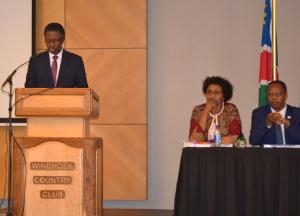Namibia host 2nd National Health Assembly
Namibia hosted the 2nd National Health Assembly on 21 February to take stock of achievements of the past year and coordinate health interventions of partners in the country. During his opening remarks, the Minister of Health and Social Services, Hon. Dr Kalumbi Shangula, reiterated the government’s commitment towards the health of its people which has translated in major milestones in the health sector. He referred to the fact that the government can now locally train health professionals such as nurses, doctors, pharmacists, dentists and others. Despite progress and achievements in the health sector, he acknowledged that the government still has a lot of ground to cover making reference to the unmet targets 4 and 5 under the Millennium Development Goals.
The Honorable Minister highlighted Human Resources for Health (HRH) as one of the priorities for the 2019/2020 fiscal year. A HRH Situational Analysis report by the World Health Organization (WHO) and IntraHealth will inform this exercise. He also listed communicable and non-communicable diseases as priority areas of intervention for the Government.
In her welcoming remarks, the Deputy Minister of Health and Social Services, Hon. Julietha Kavetuna, said jointly ‘we have a tremendous opportunity to transform the future of our beloved country, strengthen health and economic security, and deliver on the goals for a new era of sustainable development.’ She further said that the Health Assembly allows the Ministry to provide leadership, coordination and guidance which minimizes duplication and ensures the optimal use of limited resources. It also provides an opportunity to strengthen national and regional levels to prepare, prevent, detect and respond to health needs efficiently and timely. She further emphasized the role of the Health Assembly in providing guidance on how to respond to major health emergencies and outbreaks.
The National Planning Commission presented on the national Government's coordination mechanisms providing guidance on how the health sector can coordinate within the existing structures. Mr. Kamwi from the National Planning Commission said that the Office of the Prime Minister is mandated to exercise oversight over public service delivery, and thus drives the “engine” of government performance, managing the human resources and thus coordinate the national development plans, annual plans and performance agreements of government offices, ministries and agencies. He informed the meeting that the Health Ministry’s mandate is derived from the Namibian Constitution Article 95 where the state is required to maintain the welfare of the people by putting in place legislation that seek to provide health care of the people and also to ensure social welfare for the people including the weak and vulnerable members of the society. Mr. Kamwi said that the Government has set up a coordination mechanism for the implementation of the National Development Plan 5. This is a three layer structure and consists of Development Partners Forum (DPF); The National Stakeholders Fora (NSF) and The Regional Development Coordination Committees (RDCC).
National Coordination in Namibia is guided by the Partnership Policy of 2005 and coordinated by the National Planning Commission (NPC). Until recently, the health sector coordination mechanism in Namibia was not functional apart from thematic structures such as the Health Development Partners Forum and Global Fund CCM for AIDS, Tuberculosis and Malaria (NaCCATuM). With support from the UN, including WHO, a team of officials from MoHSS and NPC visited Ghana last year to learn on how the health sector is being coordinated. Taking lessons from this visit, the country held its inaugural Health Assembly in July 2018.



